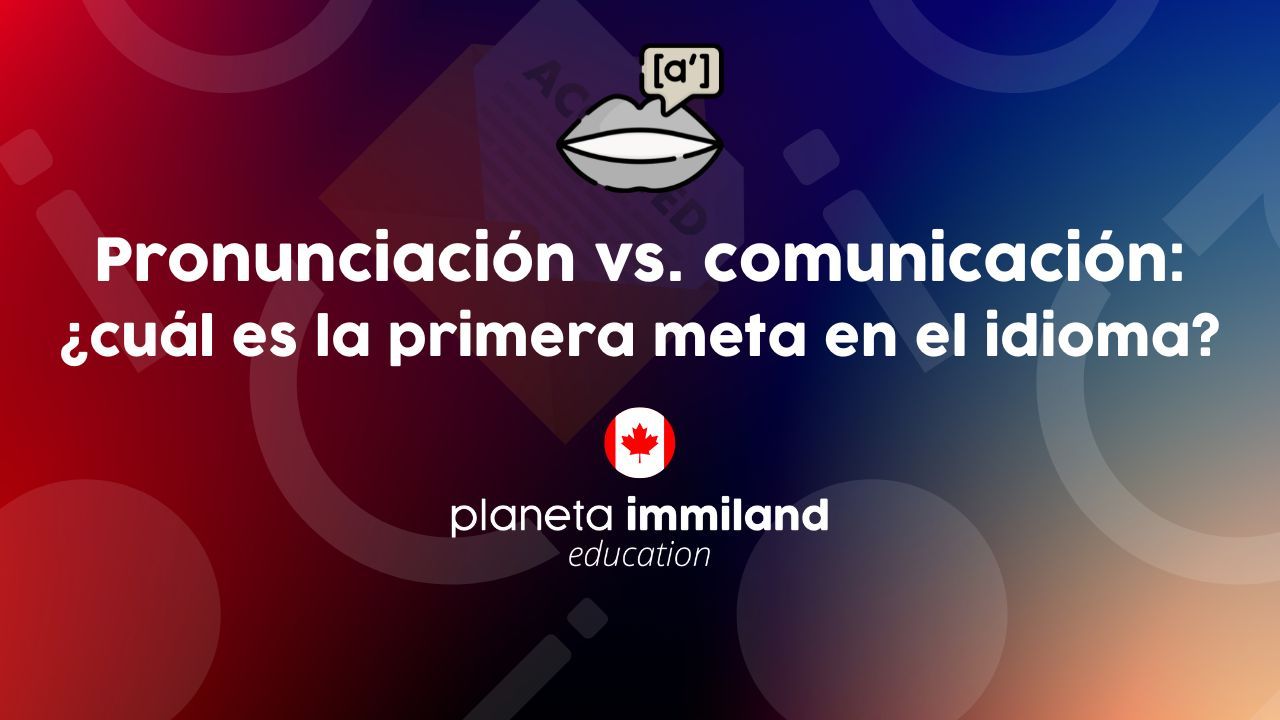Pronunciation vs. communication: which is the first language goal?
Sep 24, 2025
Written by Gabriela Estrada
In the process of learning a language such as English or French, the absolute priority in the initial stages should be functional communication. functional communication, not perfect pronunciation.
While having good pronunciation is a long-term goal, focusing on it from the beginning only takes time away and can lead to fear of speaking. fear of speaking and frustration. In this blog, I will tell you why effective effective communication is the foundation that will allow you to move forward and how to achieve it. Let's get started!
What happens in the first language lessons
First language lessons are experiences designed to provide initial contact with people and to develop linguistic survival. initial contact with people and develop linguistic survival, that is, to speak in order to have a presence in any conversation.
These lessons can last between one to two hours a day for about two months, depending on each language school. In these classes, the student focuses on:
- Greetings and introductions: with essential phrases for interacting (Hello, Goodbye, My name is....).
- Basic vocabulary: acquiring key words for everyday use.
- Base structure: understand the simplest conjugation to build functional sentences.
The goal is not the perfect accent, but for the student to be able to use the language immediately. use the language immediately to meet his or her basic needs.
Pronunciation at the first level: the necessary viable approach
The pronunciation is a skill that is honed with time and constant practice throughout the course. Fluency begins with a willingness to willingness to communicate, not perfection.
For a beginner, the initial goal of pronunciation is not to achieve a native accent, but to achieve intelligibility. intelligibility. You need to pronounce well enough for your interlocutor to understand you. A small grammatical error is usually forgiven, but a mispronunciation can completely change the meaning of a word.
To work on pronunciation from the beginning, you should:
- Identify "new sounds": focus on mastering sounds that do not exist in your native language (e.g., the French 'r', the French 'u', or the English 'th' sound). These are the ones that affect clarity the most.
- Repetition as a foundation: dedicate short, specific periods of practice to repetition to train your mouth muscles to make new movements.
Strategies for handling functional communication and pronunciation at the same time
You can make progress in both areas if you isolate them according to context:
- Prioritize flow in conversation: when you are in a real conversation (whether with a friend, in the conversation club or in a class exercise), your primary goal is to keep the flow going. keep the flow going.
Important: do not stop and correct yourself constantly. Use the words and structures you know, even if you are unsure of the pronunciation. Holding back kills confidence and communication.
- Isolate the form in practice: Set aside a specific time, outside of conversation, to focus solely on pronunciation. For example, set aside ten minutes a day ten minutes a day to repeat sounds, read aloud or use speech recognition applications. speech recognition. In this space, and only in this space, focus on the perfection of sound without the pressure of having to interact.
By separating the use (communication) from practice (pronunciation)you advance in the construction of functional sentences during your first weeks and simultaneously refine the quality of your expression to be understood effortlessly at the end of the first level.
Do you want to master new language communication from lesson one?
At Planet Immilandour methodology focuses precisely on making you a confident communicator from day one. Our English and French courses are designed to give you the tools for linguistic linguistic survival tools you need to integrate into the Canadian and other English-speaking environments.
Beginner levels, DÉBUTANT (French) y BEGINNER (English), share a goal goal: To achieve communication in everyday situations. The student, in both cases, will learn to:
- Introduce yourself: With simple phrases to introduce yourself and talk about yourself in a basic way.
- Simple interaction: By exploring functional sentences that allow for minimal information exchange.
- Vocabulary building: By acquiring expressions essential for linguistic survival.
- Develop intelligibility so that your interlocutor understands you clearly, reserving the necessary time to polish critical sounds.
The invitation is to put aside your fear of pronunciation and start your journey to fluency today. Learn about the methodology of Planet Immiland and discover how communication in a new language becomes the key to your success.
Thanks for reading, see you soon!
With love,
Planeta Immiland Education
Not sure about your level of English or French? Don't worry!
At Planeta Immiland Education we offer a free online placement test to help you find out your language level and design a personalized study plan for you. Find out your English or French level in a few minutes and start improving your language skills today!
Subscribe to our mailing list.
Leave us your contact information to learn more about our courses, tips, and promotions.


